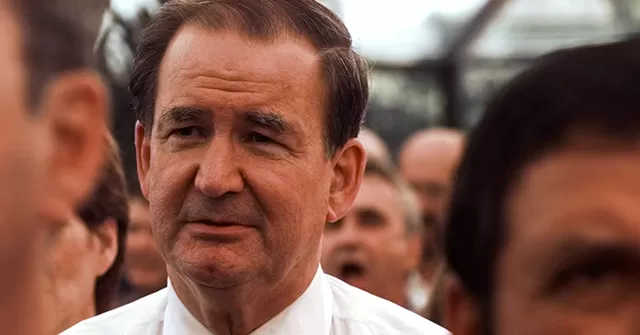In today’s globalized world, the topic of trade policies and their impact on a country’s economy is a hotly debated issue. With the rise of globalization, many countries have opened their borders to free trade, allowing for the movement of goods and services across borders without restrictions. However, not everyone has been in favor of this approach. One such person is Pat Buchanan, a conservative political commentator and former advisor to Presidents Nixon, Ford, and Reagan. Buchanan has long been a vocal critic of unchecked globalization and has warned of its potential negative effects on the American economy. In a new working paper, the question is raised: what if we had listened to Pat Buchanan’s warnings and adopted his trade policies sooner?
The paper, titled “What if We Had Listened to Pat Buchanan? A Look at the Impact of Alternative Trade Policies,” explores the potential outcomes if the United States had followed Buchanan’s advice and implemented protectionist trade policies. The paper’s authors, economists from top universities, used economic models to simulate the effects of these policies on the American economy. The results are eye-opening and provide valuable insights into the ongoing debate on trade policies.
According to the paper, if the United States had adopted Buchanan’s trade policies in the 1980s, the country’s economy would have been significantly different today. One of the most significant impacts would have been on the manufacturing sector. With protectionist policies in place, the United States would have seen a rise in domestic manufacturing, leading to more jobs and higher wages for American workers. This would have also reduced the country’s reliance on imports, making it less vulnerable to economic shocks from other countries.
Moreover, the paper suggests that adopting Buchanan’s trade policies would have also helped to reduce the trade deficit. The United States has been running a trade deficit for decades, meaning that it imports more goods and services than it exports. This has led to a significant amount of debt owed to other countries, which can have long-term consequences on the economy. However, with protectionist policies in place, the trade deficit would have been significantly lower, reducing the country’s debt and strengthening its economic position.
Another crucial aspect highlighted in the paper is the impact on the American worker. With protectionist policies, the authors argue that American workers would have been better off. The rise in domestic manufacturing would have created more job opportunities, leading to higher wages and better working conditions. This would have also reduced the income inequality gap, which has been a growing concern in recent years.
The paper’s findings are thought-provoking and raise important questions about the direction of the American economy. While globalization has undoubtedly brought many benefits, it has also had its fair share of negative consequences. The rise of outsourcing and offshoring has led to the loss of American jobs and the decline of the manufacturing sector. The paper suggests that if we had listened to Buchanan’s warnings and adopted his trade policies, we could have avoided some of these negative effects.
In light of these findings, it is essential to consider the potential benefits of protectionist trade policies. While free trade has its advantages, it is crucial to strike a balance and protect domestic industries and workers. The paper’s authors argue that a more balanced approach to trade policies could have led to a stronger and more resilient American economy.
In conclusion, the new working paper raises important questions about the impact of trade policies on the American economy. It suggests that if we had heeded Pat Buchanan’s warnings and adopted his trade policies sooner, the country’s economic landscape would be vastly different today. While it is impossible to turn back time, the paper’s findings provide valuable insights into the ongoing debate on trade policies and the need for a more balanced approach. As we move forward, it is crucial to consider all perspectives and find a solution that benefits the American economy and its workers.

